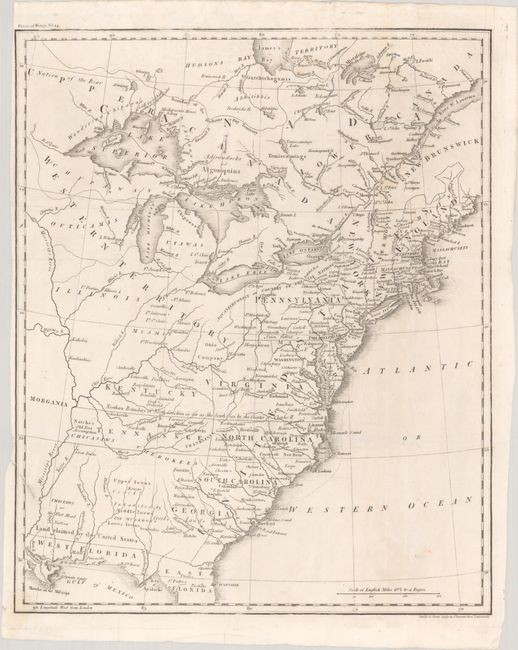Current Auction
Features the Short-Lived Franklinia and Morgania
"[Untitled - Map of the United States, Canada the River St. Lawrence, the Lakes &c.]"

Subject: Eastern United States & Canada, Franklin
Period: 1804 (published)
Publication: History of the Discovery and Settlement to the Present Time of North and South America
Color: Black & White
Size:
13.1 x 16 inches
33.3 x 40.6 cm
Download High Resolution Image
(or just click on image to launch the Zoom viewer)
(or just click on image to launch the Zoom viewer)
This great map of the fledgling nation includes numerous areas of interest, including the proposed state of Franklinia and the Spanish sponsored Morgania colony. In New England, Maine is shown with a truncated northern boundary, reflecting the British view of the border dispute. Georgia's western boundary is the Mississippi River. Florida, at the time a Spanish territory, is divided into East and West, with the notation "Land Claimed by the United States" on the northern boundary on the 31st parallel. A note above North Carolina and Tennessee states "Northern Boundary of North Carolina as far as the South Sea by the Charter of Charles II." The proposed state of Franklinia is located in eastern Tennassee. In 1785 settlers in present-day western North Carolina and eastern Tennessee organized a state government to be named in honor of Benjamin Franklin. Congress turned down their appeal, but the fledgling state maintained a legislature and governor until 1788. To the west of the Mississippi is Morgania. This region was named after George Morgan, a land speculator who attempted to create a new colony near New Madrid in what was then the Spanish controlled Louisiana Territory (Morgan gave up this endeavor a few years later).
This untitled state appears without the title Map of the United States, Canada the River St. Lawrence, the Lakes &c. above the neatline or the publisher's imprint at bottom. Engravers Smith & Jones are still credited at bottom right. Published in William Mavor's History of the Discovery and Settlement to the Present Time of North and South America (1804), which was sometimes included in Universal History, Ancient and Modern, Vol. 24 (as this example was).
References: cf. Baynton-Williams #11i; Dotson & Baker (OWA) #14a.2.
Condition: B+
Issued folding on a clean sheet with a "C & S 1803" watermark. There is a binding trim at left and a 1" binding tear that has been archivally repaired on verso.
Estimate: $1,000 - $1,300
Current High Bid:
$0
Reserve: Reserve Not Met
Next Bid: $500
Bid Increments
$500 - $999$50
$1,000 - $2,499$100
$2,500 - $4,999$250
$5,000 - $9,999$500
Terms & Conditions

